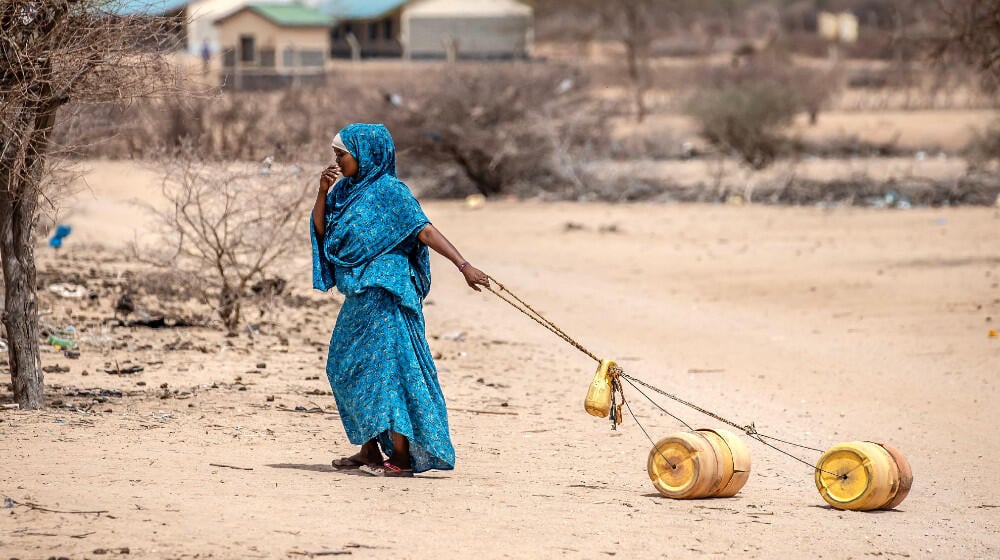A rapid gender analysis of the ongoing drought emergency in Garissa, Samburu, Kajiado, and Turkana counties in Kenya reveals a dire situation for women, girls, and other minority groups. The assessment carried out by UNFPA and the International Rescue Committee (IRC) aimed to establish the gendered impact of the drought, including vulnerability to gender-based violence, drought emergency coping strategies, and capacities, as well as constraints faced by individuals and households.
The analysis shows that the drought has worsened food security and malnutrition for women and girls due to gender norms that prioritize men over women when it comes to food in the household. Forced to walk long distances in search of water and food, they are further exposed to increased risks of GBV. Adolescent girls are engaging in transactional sex to meet their hygiene needs and other basic necessities, as families have prioritized the purchase of food due to little income during the drought.
The increased burden of care for women during the drought means that they have less time to access services that they need, including sexual and reproductive health services.
The survey utilized primary and secondary data collection methods including a household survey that garnered responses from 1,387 respondents, 48 focus group discussions, 36 key informant interviews, and 8 safety audits. The population targeted included adolescent girls and boys, persons with disabilities, adult males and females, the elderly, and other minority groups.
The assessment shows that the top safety concerns for women and girls include violence at home, forced marriage, lack of privacy, and a lack of access to services and resources. Furthermore, the assessment identified the key drivers of gender-based violence to be a loss of livelihood that has led to increased idleness among men and boys, underreporting of GBV by survivors due to fear and stigma, as well as an inadequate response by the justice system. Women stated that of the few GBV cases reported, little or no action was taken, with survivors often facing blame for the violence.
As men and boys move in search of pasture, they are leaving women, children, the sick, and the elderly behind. This has increased the care burden for women, who are taking on new responsibilities, including as heads of households, in addition to their traditional gender roles. “The increased burden of care for women during the drought means that they have less time to access services that they need, including sexual and reproductive health services,” says UNFPA Kenya Humanitarian Specialist John Wafula.
UNFPA has been working with partners including IRC, the Kenya Red Cross, and FilmAid Kenya to launch a coordinated response to the sexual and reproductive health and protection needs of women and girls in the drought emergency. More than 5,245 dignity kits, 43,358 sanitary pads, and 3,700 mama kits have been distributed to women and girls in the worst affected areas. A further 48 assorted Inter-Agency Reproductive Health Kits containing essential drugs, supplies, and equipment have been delivered to public health facilities to be used in integrated health outreaches carried out in the most remote areas. “We are also working to disseminate information on available sexual and reproductive health and GBV services including linking women and girls to GBV helplines, ambulance referrals, and other clinical services,” said Mr. Wafula.
The report highlights the urgent need for comprehensive interventions that address the immediate needs of those affected by the drought while promoting long-term solutions that address the underlying factors that contribute to vulnerabilities and gender inequality. “Measures must be put in place to reduce the risks of GBV and ensure that survivors receive the necessary support. Efforts should also be made to provide education and training to vulnerable groups, including adolescent boys and girls, to enable them to secure a better future,” said Mr. Wafula.
This is the worst drought that Kenya has experienced in the last four decades with a total of more than 5.4 million people affected. The Government declared it a national disaster in September 2021. An estimated US$15 million is required to mount a comprehensive GBV response but less than US$ 1.5 has been mobilized since 2021 because GBV remains the silent disaster beneath the drought emergency.
For more information, contact UNFPA Humanitarian Specialist John Wafula, wafula@unfpa.org.


